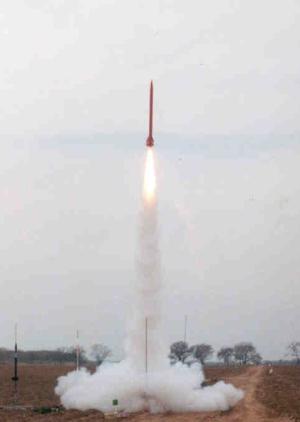Public Missiles Gotta Go - Gotta Go
Public Missiles - Gotta Go - Gotta Go
Contributed by Michael Wilkins
| Manufacturer: | Public Missiles  |
Brief:
Gotta Go - Gotta Go is a heavily modified PML Endeavor kit built to handle the
upper K class 54mm motors. Recovery is made possible by a dual deployment
system controlled by a MissileWorks altimeter and Skyangle Cert3 chutes.
Locating the rocket after flight is a breeze with a home made audible locating
system. When this bird is on the pad with a K700 loaded up and the launch
button is pushed, one thing comes to mind .... Gotta Go - Gotta Go.
Construction:
I have several PML kits ranging from small minimum diameter rockets up to some
of the larger 4" diameter rockets. The Endeavor kit was purchased
specifically for my level 2 certification. I wanted this rocket to be able to
do more than just be a cert rocket. It needed to be the "beast" in my
current fleet.
I started out with the basic kit components from PML. Basic meaning I kept the nose cone, bulkhead assemblies, centering rings, and a section of airframe. I then ordered extra bulkhead plates, centering rings, airframe, motor tube, CPR 3000 system, custom set of .125" thick G10 fins, fiberglass cloth and West Systems epoxy, 30' of Kevlar® shock cord, two Nomex® chute protectors and Skyangle Cert3 chutes. After all of this I figured I had spent enough money on a level 2 project.
First on the agenda was to fiberglass all of the body tubes. I did this with the help of a home made rotisserie that I made out of parts from a BBQ grill. The body tubes were sanded, cleaned then wrapped several times with 2oz cloth. I used the 2oz cloth to try to keep the weight down. The booster section was the first completed piece of the rocket. I started by doubling up on all of the centering rings. There was a total of five sets. A set was placed in front of and behind each set of fins. The fifth set was at the upper end of the motor mount tube.
Speaking of motor mounts, the Kwik-Switch system was thrown out and replaced with a 24" long mount to accommodate the 54/2560 case. Once the fins were in place with the secured motor mount, the booster section was then injected with epoxy. This added a considerable amount of weight. I would suggest using expanding foam instead. The bulkhead of the booster was assembled and drilled so that motor ejection could be used as a backup to the altimeter for drogue deployment.
Now came the CPR system. By design the CPR system mounts very close to the top of the airframe and provides very little support for stress during flight. I changed this. I removed the phenolic tubes for the CPR system and replaced them with fiberglass tubes from HawkMountain. I then moved the complete assembly three inches down inside the lower airframe.
The upper section was modified and built into the coupler assembly of the upper airframe. This gave me three inches of fiberglassed airframe plus the strength of the fiberglass tubes in the CPR system for a solid connection between the two pieces of airframe.
The last phase of construction was the payload bay. This was used to add ballast to the rocket, if needed, to make the rocket stable for flight. I filled the payload bay with a locator device I made with components from Radio Shack. A pair of pizeo beepers and some 9 volt batteries, using a phono jack plug for the switch. The switch was attached to the main chute so that at deployment, the chute would pull the plug and activate the beepers.
Construction completed and on to painting. This took almost as long as the assembly of the rocket. Primer, sand, primer, sand. Get the picture. The paint was applied the same as the primer. Finished outcome was a bright Banner Red rocket with black vinyl lettering.
Flight:
Did you ever get the shakes when making a certification attempt? I shook on my
level 1 and almost couldn't stay in my shoes for my level 2.
First flight ever with altimeter based deployment, and a step above the H and I class motors. I have made several flights on this kit and not once did I not shake.
Motors burned have been the K1100, K700, K550 and a J460. The K1100 flight was an awesome flight. The roar of the Blue thunder propellant and the powerful thrust. My rocket reached an altitude of 5974' with a nice apogee deployment and a main at 600'.
I have two flights on other K motors. One being the K700 and the K550. I was unable to get readings from my altimeter on these flights. The rocket was lost in a field after the K550 flight and recovered a week later after three extra trips to the launch site. That was a lovely hour and a half drive both ways. Needless to say the battery didn't last that long. The last flight was on a J460.
Another impressive Blue Thunder motor. Not a very successful flight though. Apogee was reached at just a touch over 4000 feet without a drogue deployment. The rocket came in ballistic and deployed both main and drogue at about 200 feet. This zippered all airframes. All that survived was the booster and the nose cone. Not to fret, I am in the reconstruction phase now and Gotta Go - Gotta Go will fly again.
Sponsored Ads
 |
 |











